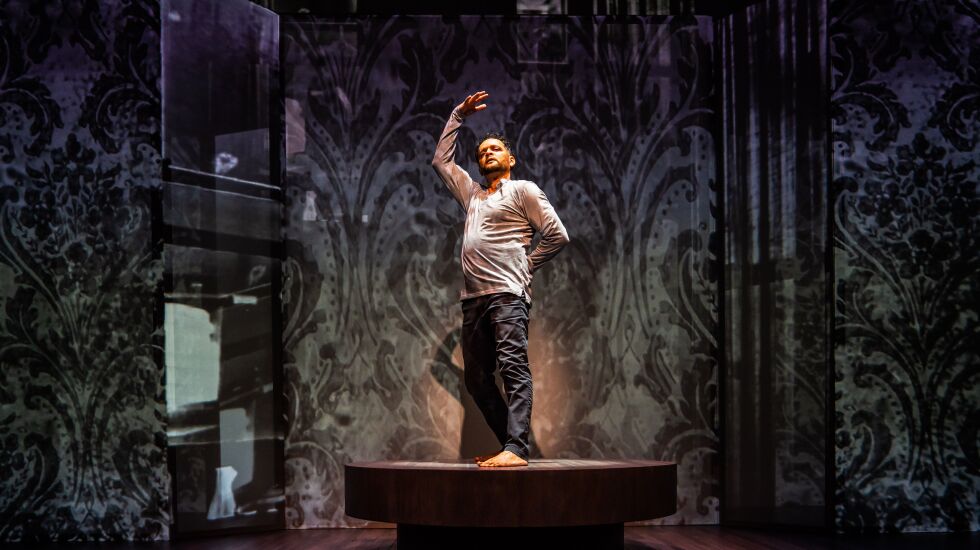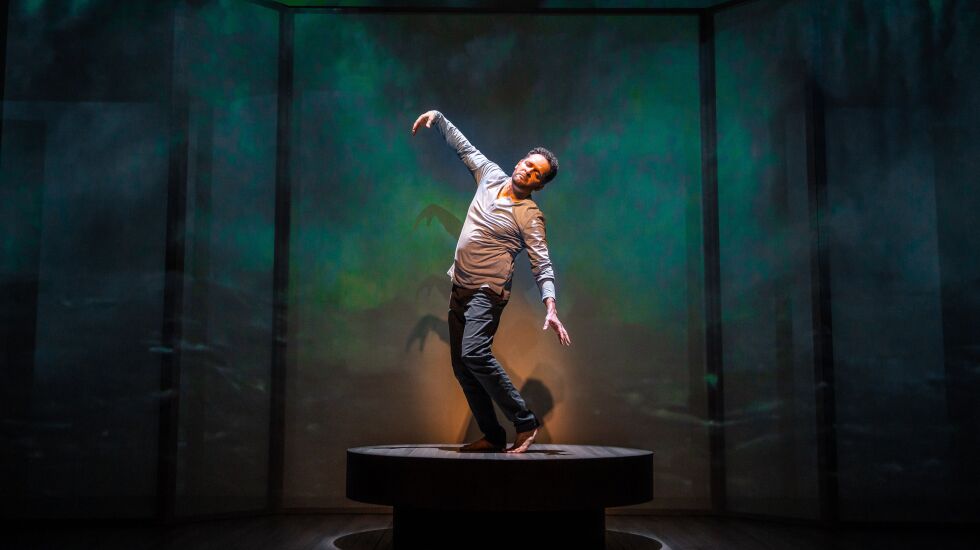
Toward the top of the emotionally charged “Antonio’s Song/I Was Dreaming of a Son,” we’re in a studio with co-playwright Antonio Edwards Suarez, who wrote the autobiographical, 80-minute piece with acclaimed dramatist Dael Orlandersmith.
As the scene unfolds, Suarez — playing himself — is unexpectedly put in charge of his five-year-old son for the day when his wife has to go to work. His young son becomes increasingly bored, Suarez becomes increasingly frustrated. The studio where Suarez had planned to spend a joyful day creating becomes the scene of brutal violence as Suarez repeatedly backhands the child in a tirade that devastates both father and son.
“Antonio’s Song” spends the next hour or so exploring the noxious, multi-generational roots of the titular character’s explosion, and the deep reflection he gives to it.
Directed by Mark Clements, the piece is the theatrical equivalent of a page-turner as it lays bare Suarez’s Brooklyn childhood in a family defined by unchecked mental illness, surrounded by a culture steeped in good, old-fashioned toxic machismo.
But “Antonio’s Song” isn’t a simple story of pathos or pity or villainy. That Suarez isn’t defined by the moment of shocking violence at the top of the show speaks to the show’s power.
What makes “Antonio’s Song” truly sing is its bone-authentic journey from the worst to the best of human nature. The rock-bottom horror Suarez conveys when he realizes he’s become a monster is matched by the transcendence he conveys when he realizes, ultimately, that he is also far more than a monster.

His story is compelling from the start, movement director Alexandra Beller’s unique blend of fluid choreography woven through words that bring Suarez’s family and his childhood to life.
We see the relentless, exhausting daily navigation he faced as a mixed-race child (Suarez claims Black, Irish and Latin roots) in a harshly segregated neighborhood. He puts us in the middle of his mother’s sickness as she violently, insistently bathes her 10-year-old son after school, veering from explosive anger to near-catatonic depression. And we see the unexpected revelation he finds one afternoon while flicking through television channels and finding himself abruptly, wholly mesmerized by iconic ballet dancer Mikhail Baryshnikov.
Luciana Stecconi’s set minimalist set design lets allows Suarez to show off his ability to create entire moods via movement. A circular gray platform surrounded by screens allows Suarez to dance from fingertips to toes, whether grooving to Marvin Gaye or Stephen Sondheim.
With “Misha” flickering silvery and bright behind him in Jared Mezzocchi’s projection design, Antonio tries to mimic the famed dancer’s seemingly impossible leaps and turns. It’s a breathtaking, kinetic portrait of art imitating life imitating art impacting life.
Throughout, “Antonio’s Song” is punctuated by scenes of embrace between fathers and sons: His own father, Suarez relays, had sickle cell anemia. When the pain became unbearable, Suarez would rock him until it eased.
Suarez’s journey from self-loathing to self-acceptance is almost derailed — more than once — by the destructive forces surrounding him. Misogyny, homophobia, domestic abuse, street crime, racism — they’re all on full, destructive display here. But as a foiled murder plot late in the story makes clear, even the most damaged, monstrous human, it turns out, is rarely 100 percent monster.
Suarez’s salvation in “Antonio’s Song” rests on a potentially stale trope that resonates with acute power. It’s the power of the arts — specifically dance and theater — that put Suarez’s youth and adulthood firmly on track and in the key of life. The devastation of childhood isn’t forgotten, but it is tamed into manageability.
There’s a final, silent moment where you can see all the tension leaving Suarez’s body, the weight of past secrets and shame seeming to roll from his shoulders. It’s a subtle, beautiful image in a production packed with them.







